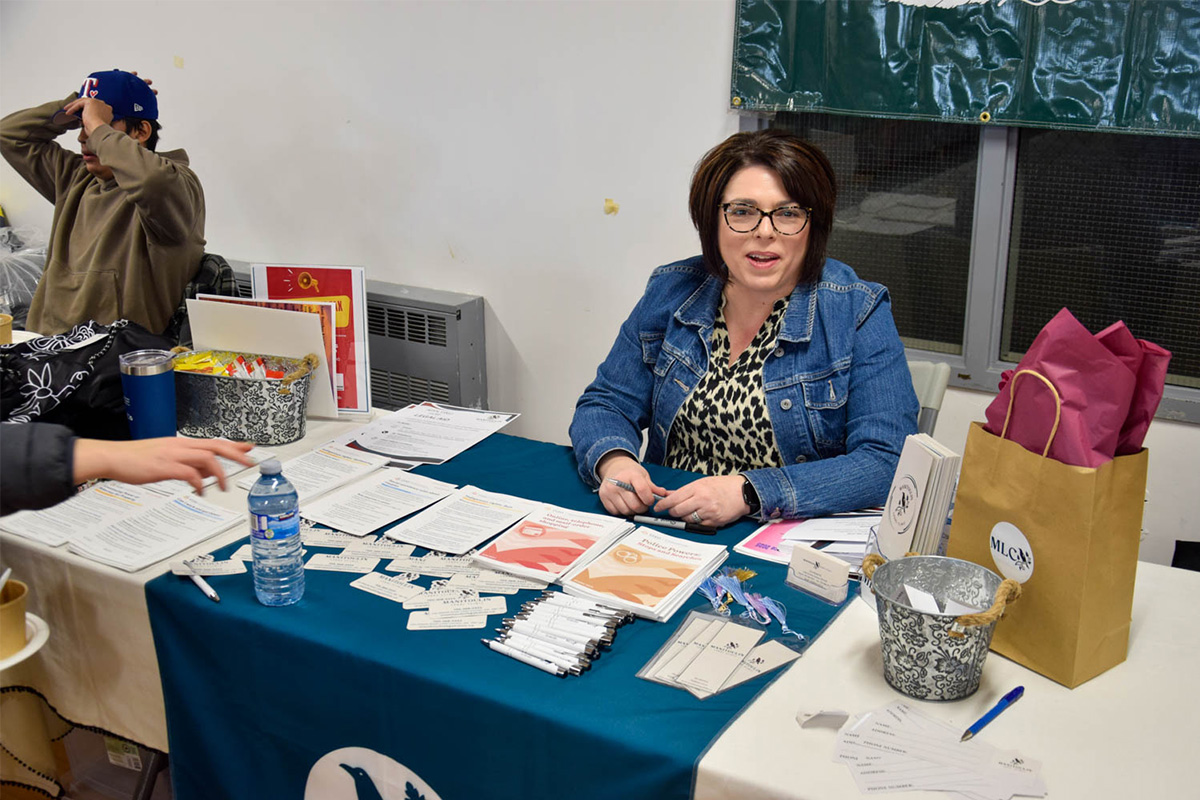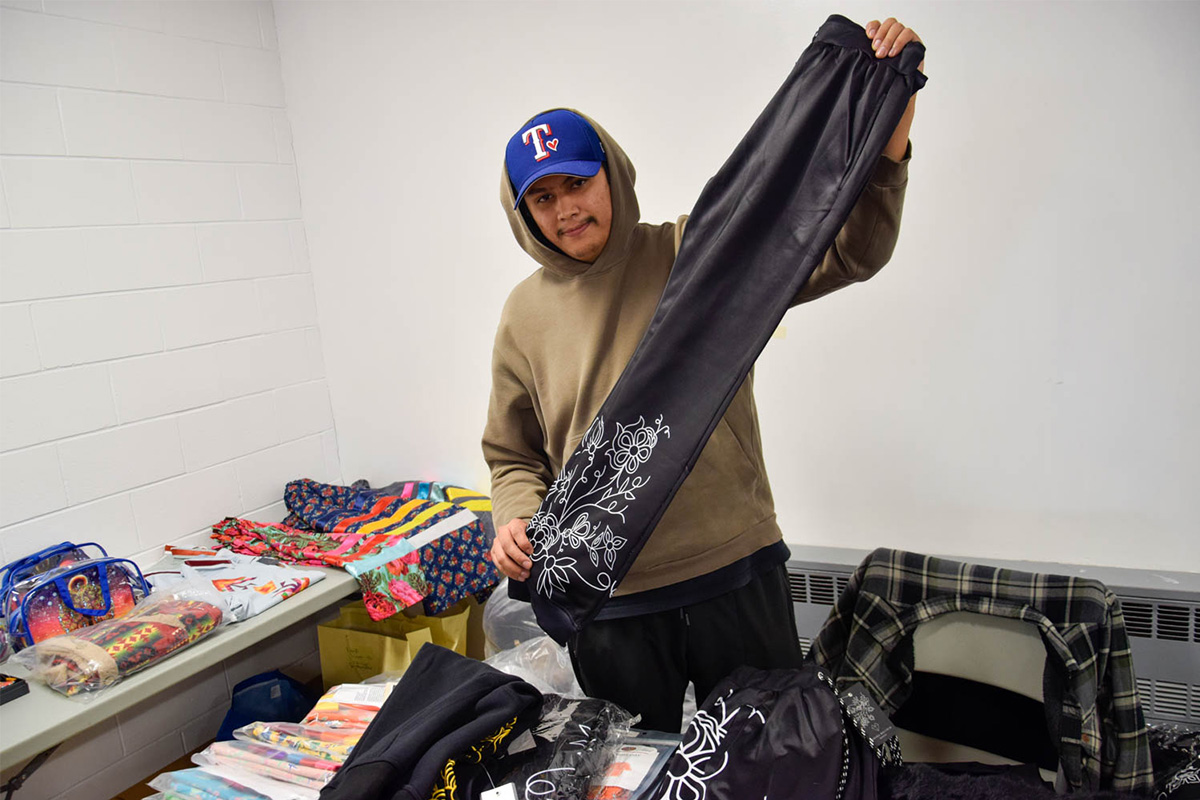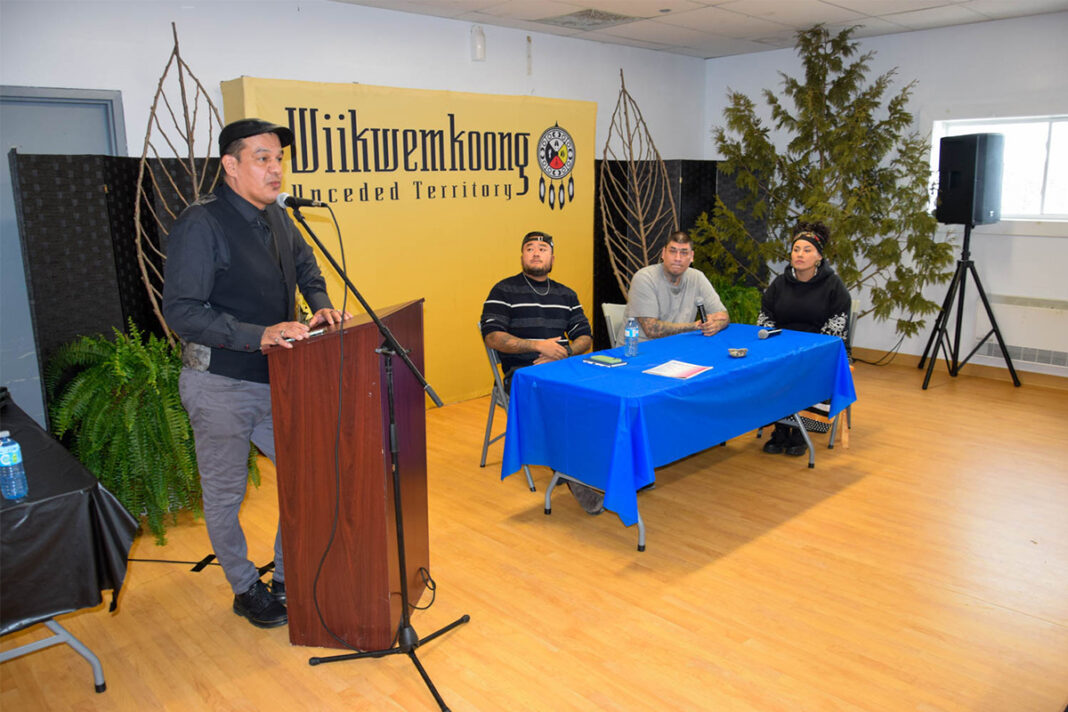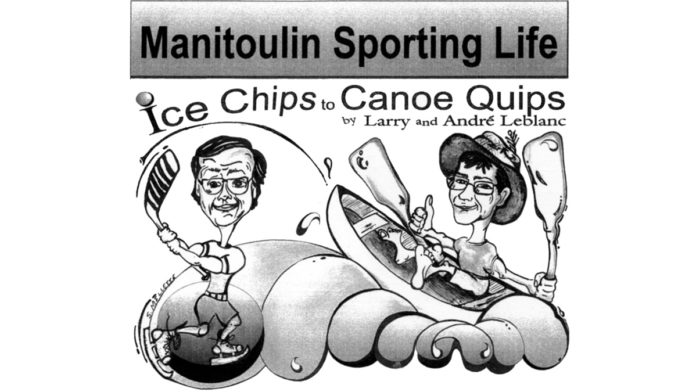WIIKWEMKOONG—Former gangbangers Andy Liu of Scarborough and Gene Malcolm of Winnipeg brought their insights to Wiikwemkoong Justice Conference 2025, taking part in a Youth Gang Awareness Panel that shed light on how gangs recruit youth and strategies to spot the signs and combat gang influence.
Mr. Liu was first up at the podium.
“I’m going to share about today is just a little snippet about my life, kind of a little snippet into the way I grew up and hopefully you can see what I went through and how I ended up here and what that story means,” said Mr. Liu. “Five parts and we’ll break it up to the way I grew up, where I grew up, my family, how I ended up being involved in gangs, how I ended up getting out and then how I ended up here.”
“I grew up in Scarborough. I’m not too sure if you guys heard of Scarborough or where Scarborough is,” said Mr. Liu. “It’s notorious for building character, as I would like to say. So, the character that I grew up with was I got involved instantly with gangs. The whole neighbourhood, the whole area is made up of little subpockets of little gang members. I grew up in Guildwood and Galloway, a very well-known area in Scarborough that bred and built a lot of criminals and delinquents.”

“I lived there my entire life. My ethnic ancestry is from Cambodia, so we’re Southeast Asian,” he said. “My parents moved us to Galloway. The area is very nice. Very, very cultural, tons of great food. People know how to season their food, you know, like, compared to other than just salt and pepper. I loved it for all that. All the experiences that I gained, despite the hardships, it really did build who I am, so that’s the first part.”
“My dad was a very, very disciplinary man, so he grew up where there was a lot of war, a lot of genocide, and it built him up to be the man who he is,” said Mr. Liu. “I don’t blame my father for the way he raised us, specifically me, because that’s what he thought. But now, when I look back at it and the way he saw me, it was horrible.”
“He wanted us to do well in school, and he also wanted us to do well in physical school, so, what I mean by physical school is anything sports-related or fitness. Academic-wise, I had to get straight As. I had to take all the sciences, the STEM programs, the map programs, and I had to get an A minimum, if I didn’t, it was push-ups or sleeping outside. There’s lots and lots of trauma from my father—the good thing is, I learned a lot. I learned a lot about science, learned a lot about parabolas. I learned a lot about anything related to math or science that I hardly use today. Not gonna lie, when it comes to fitness my father, back in the time when he was in Cambodia, he was a boxer, so he did something similar to what Thai boxing is.”
“He wanted to give me that life, so he put me in boxing, and he put me in Thai boxing here,” said Mr. Liu. “I would say I did fairly well when I was a young kid. I competed professionally. I won a couple of medals, but what people don’t see behind that, is all the discipline and all the hard work that he instilled into me.”
But it was a brutal life for a five-, six-year-old. “I would go days, a couple of weeks, where I wouldn’t sleep because I didn’t get one thing right. If I was close to fighting an opponent in the next two months, I would have to run five, six miles every single day. If I wasn’t doing it, then my father would do this thing he loved to call ‘bedtime wakeups,’ and every single two hours he would wake me up, every two hours, every single day, just to make sure I would go run. And to me, that built such a foundation at home that I never wanted to be home. So, at around six or seven, I left. I went to go into the parks in Scarborough and just sit there, or I go to libraries and read books, just to stay away from my father.”

“Lo and behold, that’s the perfect place to find your second family,” said Mr. Liu. “I got involved at six years old. That’s when I first met “a recruiter.” This is how it played out. I went to a park, and I was just sitting there, playing at around 9 pm. Kind of crazy? A fellow young kid come up to me and say, ‘hey, what are you doing?’ I said, ‘I’m playing with sand. I’m making some sandcastles,’ and he said, ‘oh, what’s going on? Why are you out here at 9 pm?’ And I said, ‘oh, I don’t know. Don’t want to be at home because my dad’s an asshole.’ ‘Oh, interesting. My dad’s an asshole too. That’s why I’m out here. Um, why don’t you come hang with me? I’ll take care of you. I’ll be your big brother. Do you have an older brother?’ and I was, like, ‘no, I have an older sister, but she’s not that cool’.”
“That’s how easy it is to get involved,” he said. “It doesn’t start from me wanting to join. It just starts as friendship, and it starts as building that. Kind of creating that bond that I missed out on at home.”
“The third part, where I got into that life, and when I first joined, you do something called ‘getting jumped in,’ which is essentially initiation.”
The gang’s shot callers, essentially the higher ups, look at the individual who brings someone in.
“They go. Hmm, okay, this person is good with physical stuff, so, okay, this guy’s a brawler. He fights, right? He trains. He does this. So, let’s use that. And let’s use that to him getting jumped in. Me, because they knew that I was involved in a lot of physical sports.”
What followed was beating.
“I was, like, seven or eight, and they were all in a circle,” Mr. Liu recalled. “I had to fight every single person within that circle. It doesn’t matter if I’m bruised up. Doesn’t matter if I’m bleeding. Doesn’t matter if my hands are broken, and so you continuously do it until they stay stuck. And it’s different for everyone, at least from what I learned. Some of them had to steal something from their parents that was important to them, some of them had to stab a rival, some had to shoot somebody. But it’s ultimately up to what the shotcaller dictates.”
From there it was all about working one’s way up the ladder “I started off as a spotter, or like, kind of a recruiter as well, where I would be in the sandbox looking for other kids and going. ‘Hey, what’s going on, dad’s an asshole? Mom’s an asshole, mom’s not home, dad’s not home. Let me help you out. Here’s five dollars so we can go buy pixie sticks or whatever.’ So, I started there.”
From there he moved on to tagging, marking the gang’s territory with graffiti. “In Toronto, because there’s so much space, and so many people, we had to mark our territory.”
“After I tagged, I moved on into dealing drugs,” he said. “Because they found that I was very charismatic and talkative, they’re like, oh, this kid is great. This guy is definitely going to be successful.”
“I went on to dealing selling weed, crack cocaine, ecstasy, anything, and because I don’t fit the stereotypical look I was able to get away with a lot of things. I was very successful in that field. I would go into schools. I’d go into something we had in Toronto, we have called Friday Night Lights, which is like a big, big football game. Our high school football teams would come. They would face other rivals and up to five thousand.”
Being a small, bookish kid, his backpack filled with drugs would never get checked “The cops looked at me and said ‘we don’t need to look at your bag. It’s probably filled with science books’.”
By the time he was 15, high school time, he was moving up in the gang life.
Then it all changed.
“I thought these guys were my brothers,” said Mr. Liu. “I thought this was great. I thought this was awesome. Until the moment that I messed up on something. The moment when I messed up, it flipped the switch. It was like, I no longer mattered. I no longer meant anything to them, and it was about how much they can inflict pain. It was like an eye-opening. After all, I’ve done, and like everything I’ve supported and helped and furthered this—that I believed in this notion of family and suddenly you’re able to toss me out so easily. And that’s the moment when I thought to myself, ‘this ain’t it.’ If I messed up again, I don’t know if I’m going to be given a second chance. I don’t know if I’m gonna be on the news, on CP24, saying that I’m under like an underpass and shot.”
“I needed help and I didn’t know what to do. I’m 17-ish, 16 if I remember correctly, and I was, like, ‘oh my God, what am I going to do?’ I reached out to my supports, and I reached out to the people that I had great mentorships with.”
“If I didn’t receive the supports that I had, I would probably still be in the life, or I probably wouldn’t be here. To me, I reached out to my coaches. I reached out to my community members and some friends that were involved in the religious community, specifically Muslim. Because in my area, we grew up with a lot of Muslims. So, for me, I just reached out to individuals or friends, saying, ‘hey, I need some help.’”
Mr. Liu was eventually able to get out from under the gangs by leveraging the prime motivating factor—greed. But first he was offered a more horrifying option.
He was given a handgun and told to shoot his father. “I said, ‘okay, cool. No worries. I don’t like the guy anyways’.” But he was not able to carry the murder out.
“I remember just sitting in the back, just holding this handgun and going ‘am I gonna actually do this?’ I thought about it. I was shaking in the car, and I remember going into the house unlocking the door going up to my parents’ room.”
“I didn’t go through with it,” he said. Shooting his father was different than the terrible things he had done to other people. “I ran out of there. I told the guys that I didn’t do it, so we went back. They beat the shit out of me.”
He hit upon another plan.
“I proposed an idea,” he said. “I brought in a huge PowerPoint presentation with pictures and everything and I said, ‘I have all the money that I’ve earned and all the money I’ve saved. What if I give you all this? You guys leave me alone, right?’ I told them this ain’t the life for me. I told them straight up, like, you know, I’ve been here since I was six to 17-18. Plenty of years, you know, I haven’t snitched. I’ve been successful with you guys. I’ve supported and helped you with everything. I’m not running. I’m not gonna rat on you. But I need to get out. This ain’t the life for me.”
They finally relented. But he left with nothing. It was then time to fall back on the discipline instilled in him by his father.
“I took everything that I had in my core values, which is discipline, you know, respect, loyalty. A whole bunch of other good core values if you Google it,” he quipped. “I was able to apply this to good things. I went to school. I went to university. I graduated with a criminal justice degree. I went into work in law enforcement, which is kind of ironic. And then I worked there at the Border Services, so I did a lot of law enforcement there for two, three years. I left that, and I was like, this isn’t fulfilling. I want to support youth. I want to support people that I’ve gone through that I went through, and like, maybe I can stop, you know, little Andy from going through that.”
He began working with youth and the Toronto police, guiding homeless youth into transitional housing. He went on to work with the City of Mississauga as a recreational programmer, creating programs for disadvantaged youth as a sort of coach/mentor, giving them a safe place to stay. Then it was working with CMHA, “where we talked about justice policy and how we can create better programming for individuals that need it—and that’s where I’m at. Now, I’m working with Native Child and Family Services. So, in this position, I work as a concurrent disorder specialist, so I work with individuals that have challenges with mental health and substance use, that’s something I dealt with as a kid growing up. That’s where the biggest changes are.”
“Yes, I’ve done a lot of bad things,” Mr. Liu said. “Yes, I’ve done a lot of good things as well, but what’s consistent is my core values of being respectful, loyalty and discipline.”
Next up at the podium was Gene Malcolm, from Ebb and Flow First Nation Manitoba. His body festooned with tattoos, he fits the very caricature of the gangbanger he was for several years.
Mr. Malcolm’s family was impacted by the residential school system. “I used to know my language when I was three, four, five, six, seven, I lost it from not from speaking,” he said. “I did 30 years in the gang life, 22 years in jail. I was six or seven when I started. But my life started when I was four years old. These white people came into my mom’s house and they said to my mom, ‘you’re drunk.’ She wasn’t drunk, but they said you’re drunk and called the agents. They just took me and my sister.”
The home they went to told him that their mother did not want them.
He asked himself, ‘why are people doing this to me?’
There was a room with a huge mirror that he feels he was probably being watched through.
“That’s where it all starts,” he said. “When I got to that place, I didn’t care for nothing and nobody. My grandpa, my dad, nobody, I used to love them all so much. it just made me think different about the way the world is.”
He recalled sitting in a basement with a group of friends, age around nine or 10, watching a movie called ‘South Central.’ That instilled the inspiration to start their own gang—the Nine Deuces were born.
“It’s early 1992, we are little tiny boys, we didn’t even know anything else, but we just watched this movie where this black guy from Compton starts a gang called South Central, and he’s a little guy. Everyone is behind this guy because he was a good speaker.
They began selling drugs.
They took two bandanas and cut them down the middle, putting them back together to form diamond shapes. It was the mutual bond of their new “family.”
But gangs are very territorial, and Nine Deuces were stepping on Indian Posse territory.
“My Uncle Shrimpy, he was one of the founders of another game called Indian Posse in 1988,” said Mr. Malcolm. His uncle came and beat up the gang leader. “He beats Freely up, knocks his front teeth out and tells him little Gene is coming to the North End and just gonna live with us. So, I go to the North End. I started hanging out at this place called The Merchant Hotel.
“We were little kids, you know, and it got deeper and deeper. Now, once I started hanging out with Indian Posse,” he said. “These guys were all from residential schools too.”
It was a rough and tumble existence—with horrific violence simply a way of life for a 10-year-old.
“They’ll give you a gun. You can find your enemy and you shoot them,” he said. He shot his first victim in the back of the head. “I shot his whole hair off. I got a G money tattoo on my finger after that. And then they’re like, ‘oh, this guy’s crazy,’ you know. So, after I think to myself? Like, all right, I could shoot people, you know, what I mean? When am I dealing with these guys? Why am I letting these old men tell me what to do. I’ll just shoot them, you know, after they die.”
He began taking pills, started drinking.
Being under the age of 10, the gangs knew he would not be charged.
“I turned 12 and cops already know about everything I’ve been doing,” he said. When he took his father’s gun and robbed a group of youth when he was he was arrested for the first time. It began a cycle.
“I used to just go to jail on purpose,” he said. “I would just steal a car or something. Just crash it and wait for them to come arrest me so I can go home. Just to get a break from the streets. I did 10 years in segregation and it didn’t break me. They tried to break me. There were people come outside my door (makes a whooping sound familiar from many Hollywood movies) and I can’t get them because of the metal door. The guards are racist. The people were racist.”
He is now 40 and looking back on his life.
“I mean, all the friends that I thought were solid, all these guys that I look back at now that I looked up as heroes, they’re all dead,” he said. “These guys are all dead before they were even 40.”
Mr. Malcolm recalled how he could easily murder someone and feel no remorse. The drugs and street lifestyle had brought with it schizophrenia and a spiralling life.
“I literally lost my mind—the devil came to see me and he gave me an exacto knife and he said, ‘if you kill somebody, and you kill yourself, I’ll let you see your dad,’” recalled Mr. Malcolm. “It was a white man sitting beside my jail cell.”
The turnaround in his life came with the birth of his son.
“What I’m scared about is like, what if he has that in him,” he said. “Like, I have that in me, you know what, I mean. To take another life. To shoot anybody on the spot.”
The life he lived in the gangs is still going on today.
“So, that’s why I’m like coming here today, just like I’m a proud Native man,” he said. “I might look different than everybody, but I’m just as Native as everyone you know. I’m trying to just raise awareness and let you guys know. Don’t yell at your kid when you see them struggling, or like crying or quiet or anything like that. Don’t give them lickings, don’t tell them they’re weak.”
Mr. Malcolm noted that it was thanks to his sister Tamara, who always stood by him, that he was finally able to break the chain that bound him to the gang life.
He noted that many people from the Northern reserves wind up in the city, whether on medical leave or some other reason, and then wind up trapped there. Perhaps winding up in a small hotel where someone helps them deal with their isolation with “free” drugs.
The panel were asked how to spot gang influence in the community.
“Easiest signs, for sure, is like when it comes to gangs is seeing colours,” said Mr. Liu. We kind of wear colors for pride in what we represent. So, Gene mentioned something called rags, so rags are like just indicators like little bandanas or certain colors that we wear. So, whether it’s red, blue, or whatever it is. Like, if your child is just getting money out of nowhere, if they’re buying you clothes, if they have smartphones, games, little things that you’re not used to seeing.” Isolating themselves or hanging out with friends that you’ve never heard of are also signs. “Money is the biggest indicator, the rags, the colors, those are the main ones.”
“Man, your kids need you like, do something for your kids,” said Mr. Malcolm. “Do something you’ll feel better when you get your kids better stuff than yourself. You know what I mean? Like, because that’s what we’re here for is to make our kids, so it’s better.”
Asked about his connection with his Creator, Mr. Malcolm said that he is trying to connect with his traditions and culture, going to powwows and participating in sweat lodges.
Both panellists warned the community that urban gangs are targeting small rural communities because the pickings are easier.
They advised the community to do everything in their power to send the gangbangers packing. “One person can’t tell these people, it has to take everybody you know,” said Mr. Malcolm.
“Gangs are very, very smart,” said Mr. Malcolm. “They specifically target isolated communities.” The attraction is that drugs will sell for much more in a small, isolated community than in a downtown Toronto neighbourhood.
Social media has given gang recruiters a much longer reach, they noted. It is important to foster a close relationship with your children, otherwise they will find another family in the gangs.
“Have those sit-down conversations, if you have those dinners together, you have those conversations of ‘hey, how is it going? How was the school? How is this? How are your friends? Are you still talking to Sam’ or whatever it is. I think that fosters and prevents a lot of things from happening,” said Mr. Liu.
The key message presented by the panelists was that criminals do not like the limelight and if they know that they will be reported to the police by the neighbours, they will eschew that community. While the community stays silent because of fear, the criminals can feast. “They don’t want to get caught,” said Mr. Liu.
“Don’t be scared to report it. If you have like a group of people, like a Neighbourhood Watch, you can make it uncomfortable for the dealers,” said Mr. Liu.
“Everybody should be aware,” agreed Mr. Liu. “Don’t be afraid to report it. I never wanted to encourage people to be being telling on people, but in this kind of situation where it’s hurting our families and our friends and our kids and our and everybody, just let’s get rid of them. If I knew someone was always telling someone, you’ll stay away from that person.”





